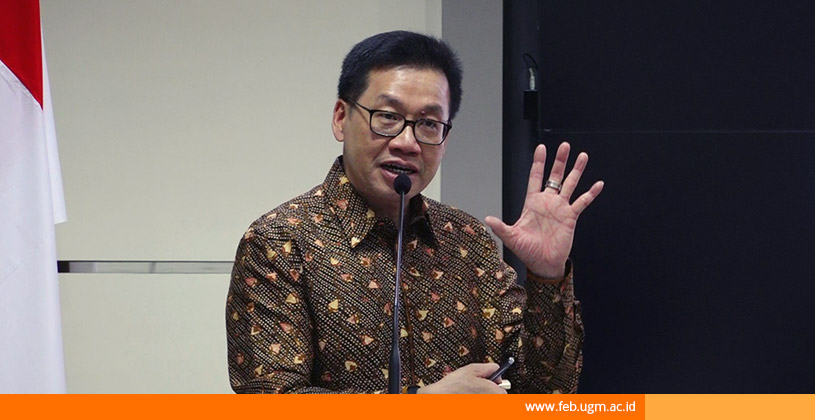Eight leadership competencies needed at this time
- Details
- Written by Sony
- Category: News
- Hits: 1522

Wednesday (23/10) the Faculty of Economics and Business Universitas Gadjah Mada (FEB UGM) in collaboration with the Indonesian Bankers Association (IBI) held a public lecture entitled "Leadership in the Midst of Global Uncertainties". Located in Learning Center Auditorium FEB UGM, this event is one part of the IBI Goes to Campus 2019. This public lecture presented by Haryanto T. Budiman, Ph.D as the Managing Director and Chief Executive of J.P. Morgan Indonesia and Chairman of the Indonesian Bankers Association as the main speaker.
Related to the topics discussed, according to Haryanto, there are several challenges faced by Indonesia to realize its best potential in the midst of global uncertainty. Indonesia needs to being the net importer of oil putting which places the country in a vulnerable position under the "oil shock" scenario. Then, low farmer productivity results in high production costs and limited supply, often necessitating imports. Resource productivity due to the lack of skilled labor is also an important challenge to be considered at this time.
Haryanto gives an overview of the evolutionary history of leadership. According to him, during ancient times, for thousands of years, the strongest among the crowd automatically became the leader of the pack. Then it began to shift since the end of the 19th century and the early part of the 20th century, leaders were identified based on a combination of intelligence, experience, and past performance. Then it began around 1980, as work became more complex (rendering previous experience and past performance less relevant). Leaders were identified through a series of competencies that are defined as characteristics or skills that have predictive capability on performance.
"Currently recognizing leaders in a new environment is the leaders must have leadership competencies," he said. He mentioned that there were eight leadership competencies needed at this time, namely strategic orientation, market insight, results orientation, customer impact, collaboration and influencing, organizational and development, team leadership, and change leadership. Then the most important is the leader must have integrity, values, and potential that can be used to change the business environment and foster curiosity, insight, determination, and engagement.
Source: Sony Budiarso/Leila Chanifah Zuhri


